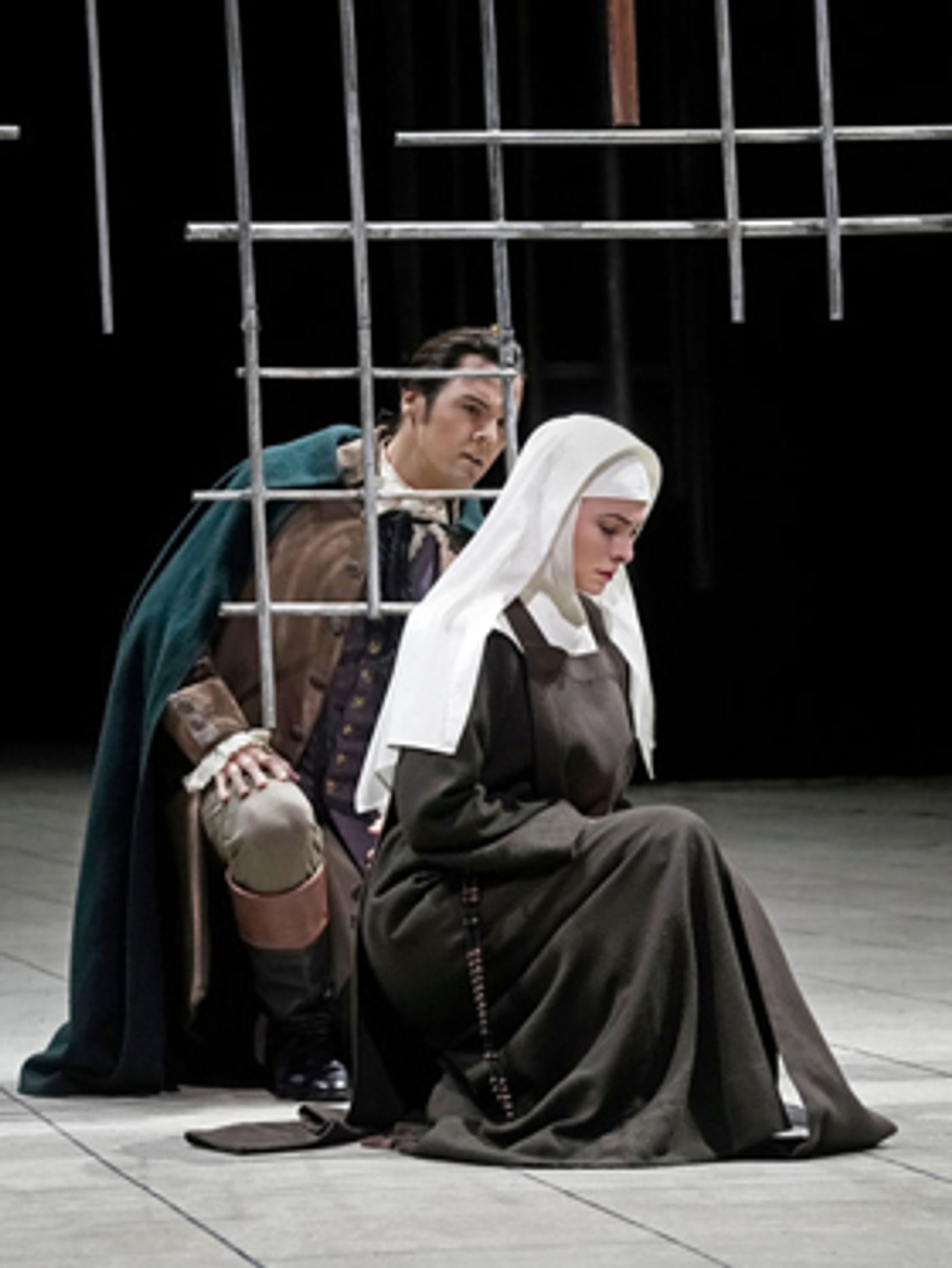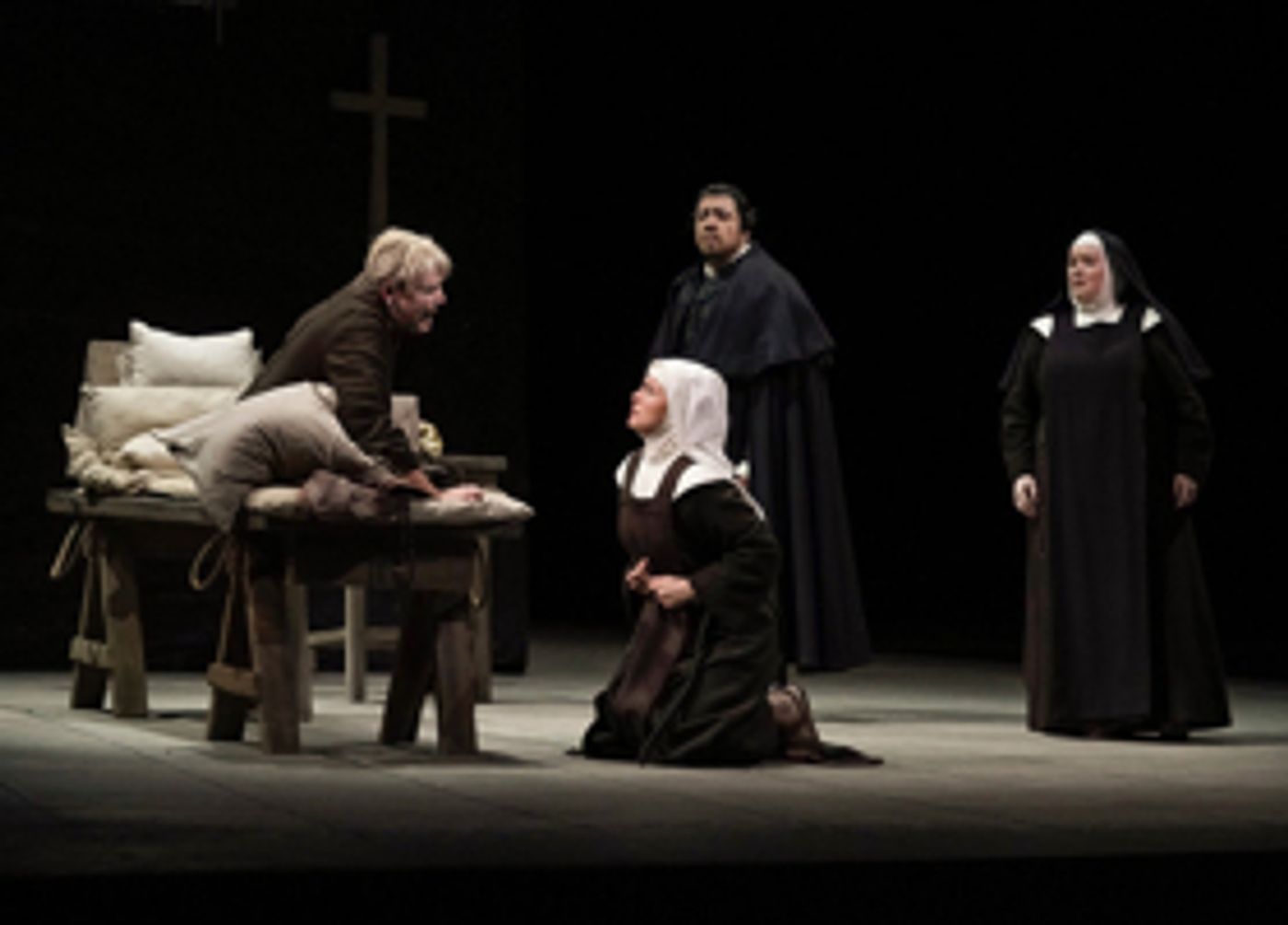Review: Leonard Is CARMELITES' Soft Center in Met's Brilliant Production

Photo: Ken Howard/Met Opera
You'd never know that the Met's production of Francis Poulenc's DIALOGUES DES CARMELITES is over 40 years old, except for a few giveaways. There are no dancing nuns, no nudity, no screeching train whistle as the women go to their deaths (a la SWEENEY TODD).
This fictionalized version of the story of Carmelite nuns who were martyred during the French Revolution, sent to the guillotine, is certainly the most simple and eloquent work on the Met's stage these days.
Created by John Dexter with set design by David Reppa, lighting by Gil Wechsler and costumes by Jane Greenwood in February 1977 (directed now by David Kneuss), the music and libretto by Poulenc (after a play by Georges Bernanos) it is a model of the timeless. I shudder for the day when someone decides that it needs a hydraulic lift to hoist the church-sized cross that is central to the production, so that its presence is more obvious.
Under the deft baton of the Met's Music Director Yannick Nezet-Seguin--and the spectacular playing of the Met orchestra and singing of the Met chorus under Donald Palumbo--the opera soars without ever being overdone. (Even the incredibly dramatic death scene of the old prioress, Madame de Croissy, portrayed brilliantly here by Karita Mattila, seems just right.) In fact, everything appeared perfect to me, except for the central character of the piece, Blanche de la Force or, as she is known when she joins the convent, Blanche of the Agony of Christ, sung here by Met favorite of the moment, mezzo Isabel Leonard.

Karin Cargill. Photo: Ken Howard/Met Opera
Blanche is supposed to be a broken flower, damaged to her core, but it seemed to me that, while she sounded quite good, on this occasion she virtually disappeared into the scenery--and there's not much of that. (I didn't feel that way about Leonard in the previous revival of the classic, by the way.) I found her to be almost a shadow and, when she seemingly loses her faith and bolts from the convent as the French Revolution being to teem around her, I felt her presence was hardly missed. Reappearing at the very end, to lend strength to the fearful novice, Sister Constance (a wonderful Erin Morley), I momentarily forgot who she was.
Otherwise, the cast was exemplary, the tight ensemble the opera calls for, with standout work from alto Karin Cargill as Mother Marie, who proposes the vow of martyrdom after the Old Prioress has died but nearly loses her chance when she's off site when the convent is closed. While soprano Adrianne Pieczonka may not have the presence that some others have brought to the role of Madam Lidoine, the new Mother Superior (say, Leontyne Price who made her opera debut in the role, or Shirley Verrett), she brought a firm simplicity.
There was good work from rising star mezzo Emily D'Angelo (as Sister Mathilde) and, in one of the few male roles, tenor David Portillo as Blanche's brother, the Chevalier de la Force. Scott Scully made the most of his small roll of one of the commissioners who give the nuns the bad news about their expulsion from their home.

Photo: Ken Howard/Met Opera
This is an exquisitely subtle score, without any huge showpieces (except for de Croissy's death scene), but the heartfelt "Salve Regina"--repeated by the singers and orchestra, as the nuns are marched, one by one, to the guillotine, was as powerful a piece of music as can be heard at the Met. The Dexter production--with its use of the stage-sized cross, first covered with prostrate nuns and in the finale, empty of anyone at all--paired with Poulenc's moving score, in the end, makes the evening so devastating.
There are just two performances left of the opera this season. Even if this CARMELITES has a soft center, it's well worth hearing, and seeing. Go.
The final performances of DIALOGUES DES CARMELITES will be on May 8 and the matinee of May 11, when it will be transmitted worldwide as part of the Met's Live in HD series. These broadcasts are now seen in more than 2000 movie theaters in 73 countries around the world. Curtain times vary: complete schedule here. Running time is just over 3 hours, with one intermission.
Tickets begin at $25; for prices, more information, or to place an order, please call (212) 362-6000 or visit www.metopera.org. Special rates for groups of 10 or more are available by calling (212) 341-5410 or visiting www.metopera.org/groups.
Same-day $25 rush tickets for all performances of Dialogues des Carm'lites are available on a first-come, first-served basis on the Met's Web site. Tickets will go on sale for performances Monday-Friday at noon, matinees four hours before curtain, and Saturday evenings at 2pm. For more information on rush tickets, click here.
Reader Reviews
Videos

